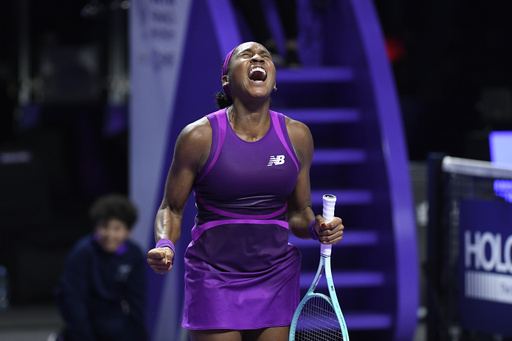
Coco Gauff has proven that she pays attention to online comments, and she often enjoys responding to critics. As such, it was no surprise when she took to social media after concluding a successful 2024 season with a victory at the WTA Finals, along with a lucrative $4.8 million payout. Gauff humorously expressed her satisfaction by tweeting, “lol safe to say I beat the bad season allegations.”
In Riyadh, Saudi Arabia, Gauff clinched her title by triumphing over the top two ranked players—Aryna Sabalenka and Iga Swiatek—before facing Olympic gold medalist Zheng Qinwen in the final match. Gauff’s hard-fought victory against Zheng, with a score of 3-6, 6-4, 7-6 (2), capped her year with a commendable 54-17 record and three titles.
Reflecting on the rollercoaster of her season, the 20-year-old from Florida shared, “There were many ups and downs. Some moments felt great, while others felt awful—essentially just a typical year on tour.” Despite her success, Gauff didn’t shy away from discussing her disappointment at the U.S. Open, where she suffered a tough loss. “The worst? Definitely my U.S. Open loss. I felt that was just a hard loss for me, because I double-faulted so many times,” she admitted, laughing at herself. “It felt like I was close but just didn’t give myself the best chance.”
The aftermath of her fourth-round exit, where she hit an alarming 19 double-faults against Emma Navarro, became a turning point in her career. Following that defeat, Gauff made a significant decision by parting ways with her coach Brad Gilbert and bringing Matt Daly into her team to work alongside Jean-Christophe “JC” Faurel.
Subsequently, Gauff turned her season around, achieving a remarkable 13-2 record in her last three tournaments, which included two championships and a semifinal finish. “The essential lesson is that after hitting a low, the only way to go is up,” Gauff stated. “At that point, I just said, ‘Well, I need to improve on certain things and just focus on that.’ As a tennis player, it’s not feasible to skip tournaments just to practice—that didn’t feel right to me—so I chose to embrace both the losses and wins while still honing my skills.”
So far, her strategy appears to be working. A key improvement during the WTA Finals was her average of 4.6 double-faults across five matches, a marked reduction from her performance at the U.S. Open. In the championship match, Gauff recorded more aces (five) than double-faults (four), as well as a stronger first-serve percentage (64% to 62%) and a higher winning percentage on first serves (70% to 62%) compared to Zheng, known for her powerful serves.
Gauff’s road to victory was challenging and included impressive wins over top players like Sabalenka in the semifinals and Swiatek in the round-robin. This feat made her the youngest player since Maria Sharapova in 2006 to defeat the top two women in a single tournament.
“She’s a fighter,” Sabalenka praised Gauff after witnessing her determination. The final itself became an intense battle, as it was the first WTA Finals championship match to be decided by a third-set tiebreaker and lasted an exhausting 3 hours and 4 minutes, marking it as the longest title match in the tournament since 2008.
As Gauff progresses in her career, she continues to display strong decision-making on and off the court, evidenced by her swift recovery from her U.S. Open disappointment. Additionally, her achievement of becoming the youngest champion at the WTA Finals since Sharapova in 2004 highlights her promise in the sport. “Playing against the best of the best really instills confidence in my game,” Gauff concluded, reflecting on her continued growth as a competitor.
